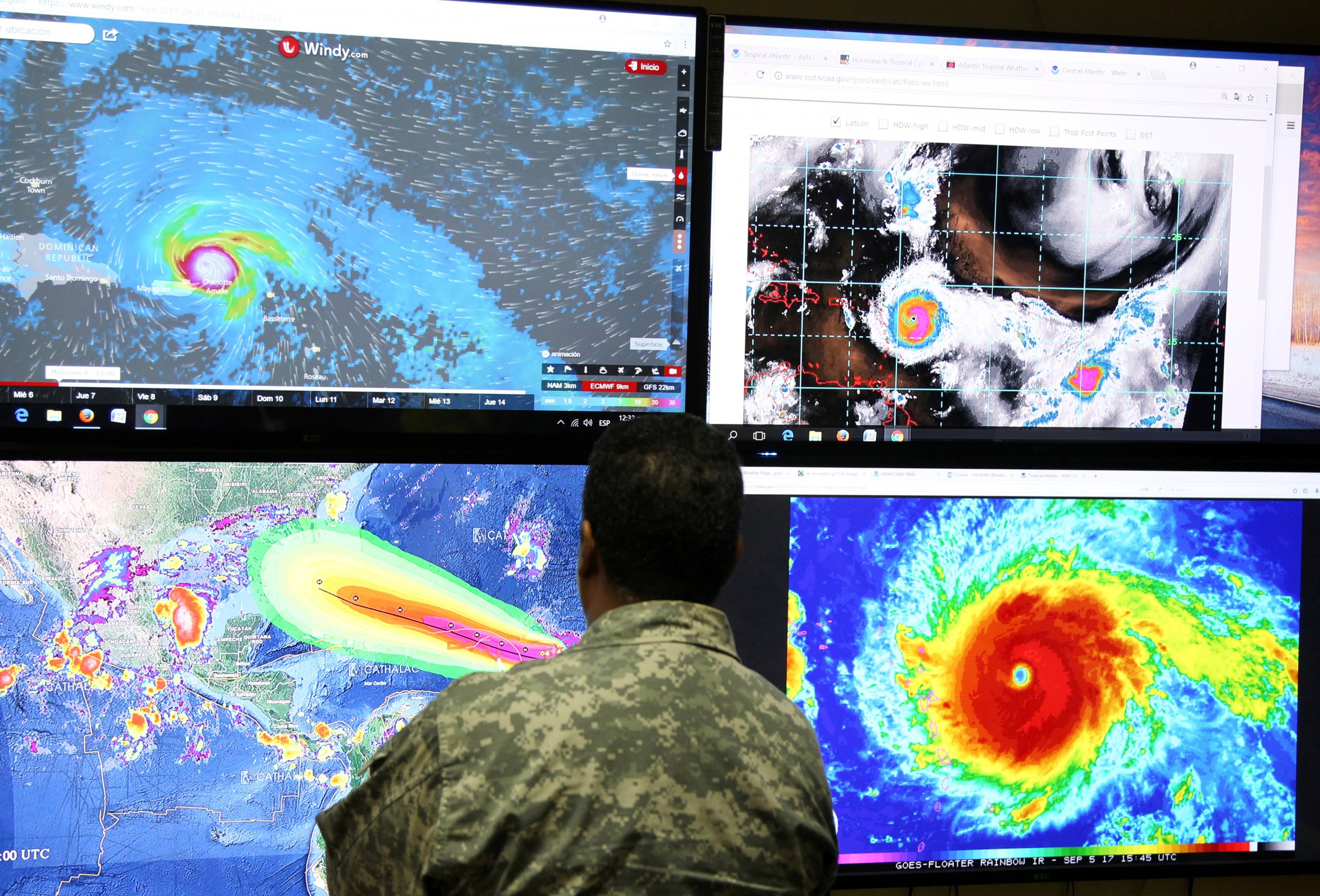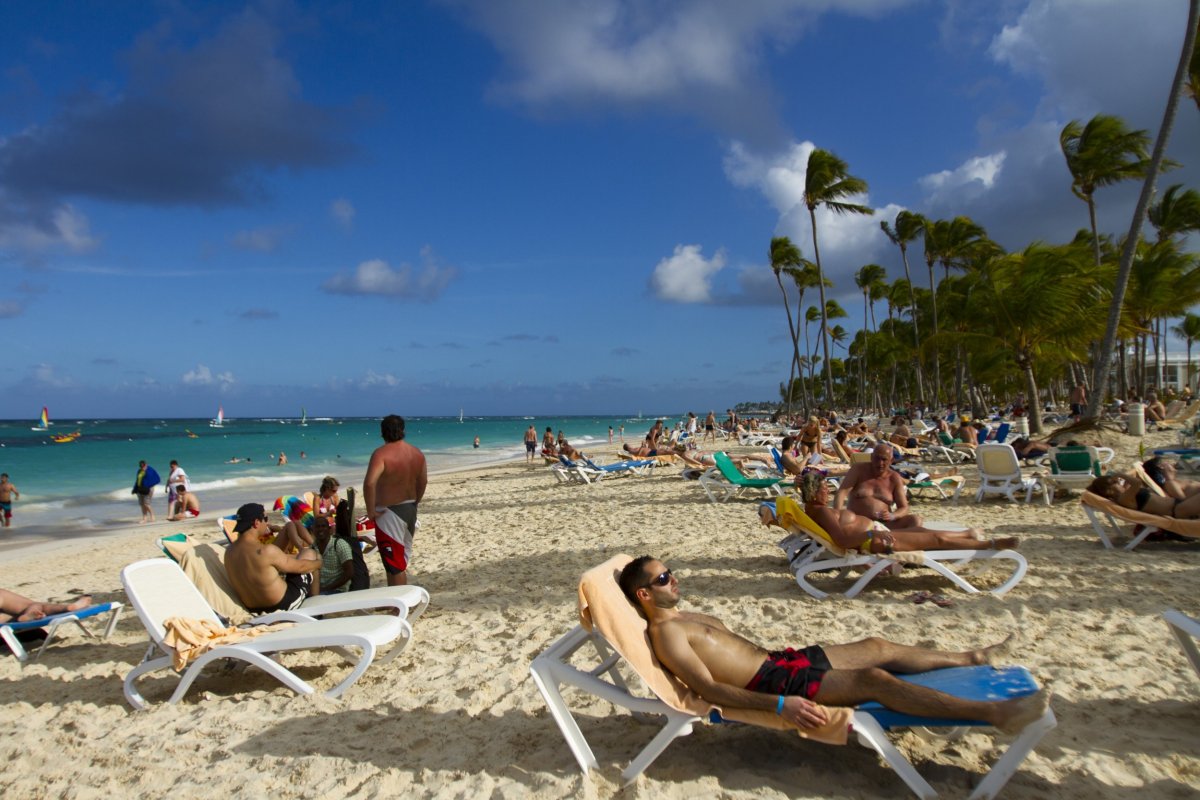
Hurricane Irma has hit the Caribbean, with the eye of the category 5 storm—the most powerful hurricane ever recorded in the Atlantic Ocean—passing over Barbuda early on Wednesday, bringing winds of 185 miles per hour to bear on the tiny island.
No way to sugarcoat it. Irma is the type of tropical cyclone that wipes everything, including all vegetation, clean from small islands. pic.twitter.com/QnNYT7IWDo
— Anthony Sagliani (@anthonywx) September 6, 2017
Irma is moving west-northwest at a speed of around 16 miles per hour, according to an update issued by the National Hurricane Center (NHC) at 5 a.m. eastern time.
The potentially catastrophic hurricane is due to move over the northern Leeward Islands and pass nearby to Puerto Rico later on Wednesday.
It is due to hit the Dominican Republic by late Wednesday or early Thursday, before progressing towards Haiti, Cuba, and potentially Florida by the weekend.
The Dominican Republic is one of the most popular destinations for American tourists traveling abroad, and the United States has a substantial Dominican population.
Here's what you need to know about the island and how Hurricane Irma could impact it.
Where is the Dominican Republic?
Less than a three-hour flight from Miami, Florida, the Dominican Republic is a Caribbean nation in the North Atlantic Ocean.
The Spanish-speaking country occupies an island called Hispaniola, which it shares with Haiti, a smaller Francophone nation on the west of the island.
The Dominican Republic has a population of over 10 million and is far more developed than neighboring Haiti: GDP per capita in the Dominican Republic stands at around $6,700, while in Haiti it is less than $1,000, according to World Bank data.
Tourism is the main industry on the island nation, and the United States is its most important trading partner.
Why is it so popular with Americans?
Behind Mexico, Canada and the U.K., the Dominican Republic is the most popular destination for U.S. residents traveling abroad. Some 2.8 million American citizens visited the island in 2015, a 3 percent increase from the previous year.
The island is undoubtedly popular due to the beaches that line its 800-mile coastline, but the Dominican Republic also has a rich cultural history. The capital, Santo Domingo, is the oldest city in the New World, and its colonial quarter—decorated with Spanish architecture—is classified as a UNESCO World Heritage site.

There is also a significant diaspora from the Dominican Republic in the United States. Some 1.8 million Hispanics of Dominican origin lived in the United States in 2013, according to the Pew Research Center, making Dominicans the fifth-largest Hispanic population in the country. Remittances from U.S. Dominicans contribute around 5 percent of the country's income.
What impact could Hurricane Irma have?
A Hurricane warning is currently in effect for the Dominican Republic from the eastern port of Cabo Engano to the northern border with Haiti. This means that hurricane conditions are expected on the island and that "preparations to protect life and property should be rushed to completion," according to the NHC. On the southern side of the Dominican Republic, tropical storm conditions are expected.
The eye of Hurricane #Irma went right over the island of #Barbuda and is approaching #Anguilla with 185 MPH sustained winds and gusts to 225 pic.twitter.com/nmkCnV4FWO
— Kevin Arnone (@Kevin_Arnone) September 6, 2017
The NHC predicted storm surges of up to 5 feet in the northern Dominican Republic and rainfall of up to 15 inches in isolated spots. Hurricane conditions are expected to begin on early Thursday.
What is the Dominican Republic doing about Irma?
Dominican President Danilo Medina held an emergency meeting on Monday with the country's emergency commission. The government said that it was prepared for the hurricane. "From this moment on, we are in a state of continuous monitoring," said Jose Ramon Peralta, minister to the president, according to Reuters.
Mandatory evacuations are in place for the eight coastal provinces in the Dominican Republic, CBS News reported.
What about U.S. travelers heading to the Domincan Republic?
The U.S. State Department issued a travel warning for the Dominican Republic on Tuesday, asking citizens to "carefully reconsider travel" to the nation ahead of Irma's expected impact.
Some U.S. airlines have put waivers in place to allow passengers to reschedule flights to certain destinations in the Caribbean; United Airlines is allowing customers traveling to the Dominican Republic to change any travel scheduled on or before September 12.
Many Dominicans resident in the United States are asking for prayers and support on social media as the storm heads for the island and others in the Caribbean.
Dominican Republic is such a poor country, this storm is scaring me. May God be with my beautiful country __
— Ms. Garcia (@GimmieDaFries) September 5, 2017
I know Irma coming may seem scary for us in Florida but send some prayers to Haiti, Puerto Rico, Dominican Republic, Cuba & the Bahamas. pic.twitter.com/4TgzSDSboK
— Nicole Hernandez (@nlzxo) September 5, 2017
Uncommon Knowledge
Newsweek is committed to challenging conventional wisdom and finding connections in the search for common ground.
Newsweek is committed to challenging conventional wisdom and finding connections in the search for common ground.
About the writer
Conor is a staff writer for Newsweek covering Africa, with a focus on Nigeria, security and conflict.
To read how Newsweek uses AI as a newsroom tool, Click here.








